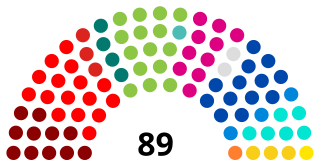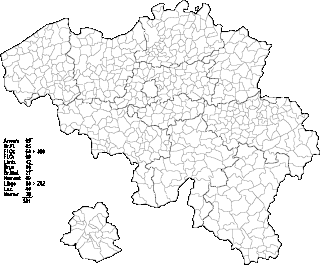
The politics of Belgium take place in the framework of a federal, representative democratic, constitutional monarchy. The King of the Belgians is the head of state, and the prime minister of Belgium is the head of government, in a multi-party system. Executive power is exercised by the government. Federal legislative power is vested in both the government and the two chambers of parliament, the Senate and the Chamber of Representatives. The federation is made up of (language-based) communities and (territorial) regions. Philippe is the seventh and current King of the Belgians, having ascended the throne on 21 July 2013.

The Kingdom of Belgium is divided into three regions. Two of these regions, Flanders and Wallonia, are each subdivided into five provinces. The third region, Brussels, does not belong to any province and nor is it subdivided into provinces. Instead, it has amalgamated both regional and provincial functions into a single "Capital Region" administration.
The Estonian Provincial Assembly or Estonian State Diet, also often called by its Estonian name Maapäev, was elected in May–June 1917 during the Russian Revolution as the provincial parliament (diet) of the Autonomous Governorate of Estonia. On 28 November 1917, after the Bolshevik coup in Russia, the Assembly declared itself the sole sovereign power in Estonia and called for the elections of the Estonian Constituent Assembly. On the eve of the German occupation of Estonia during World War I the council elected the Estonian Salvation Committee and issued the Estonian Declaration of Independence on 24 February 1918.
On 13 June 2004, regional elections were held in Belgium, to choose representatives in the regional councils of the Flemish Parliament, the Walloon Parliament, the Brussels Parliament and the German-speaking Community of Belgium. The elections were held on the same day as the European elections.

The Parliament of the Brussels-Capital Region, is the governing body of the Brussels-Capital Region, one of the three regions of Belgium. It is also known as the Brussels Regional Parliament.
Regional elections were held in Belgium, to choose representatives in the regional councils of Flanders, Wallonia, Brussels and the German-speaking Community on 13 June 1999. The regional elections were held on the same day as the European elections and the federal elections.

The Parliament of the German-speaking Community is the legislative assembly of the German-speaking Community of Belgium located in Eupen.

The Senate is one of the two chambers of the bicameral Federal Parliament of Belgium, the other being the Chamber of Representatives. It is considered to be the "upper house" of the Federal Parliament. Created in 1831 as a chamber fully equal to the Chamber of Representatives, it has undergone several reforms in the past, most notably in 1993 and 2014. The 2014 elections were the first without a direct election of senators. Instead, the new Senate is composed of members of community and regional parliaments and co-opted members. It is a chamber of the communities and regions and serves as a platform for discussion and reflection about matters between these federated entities. The Senate today plays a minor role in the federal legislative process. However, the Senate, together with the Chamber, has full competence for the Constitution and legislation on the organization and functioning of the Federal State and the federated entities. Since the reform of 2014, it holds about ten plenary sessions a year.

Elections in Belgium are organised for legislative bodies only, and not for executive functions. Direct elections take place for the European Parliament, the Chamber of Representatives, the Parliaments of the Regions, the Parliaments of the Communities, the provincial councils, the municipal councils and the councils of Districts of Antwerp. Voting is mandatory and all elections use proportional representation which in general requires coalition governments.

Malta elects on a national level 6 MEPs representing Malta in the European Parliament, on a district level the legislature, On a local level the Local Councils and on a community level the Administrative Committees.

The Belgian provincial, municipal and district elections of 2000 took place on Sunday October 8, 2000. The electors elected the municipal councillors of 589 cities and towns as well as the ten provincial councils. Additionally, the newly established district councils in the city of Antwerp were elected for the first time.

General elections were held in Belgium on 10 March 1974. The Belgian Socialist Party emerged as the largest faction in the Chamber of Representatives with 59 of the 212 seats. Voter turnout was 90.3%. Elections were also held for the nine provincial councils, as well as for the Council of the German Cultural Community for the first time.
On May 21, 1995, regional elections were held in Belgium, to choose representatives in the regional councils of Flanders, Wallonia, Brussels and the German-speaking Community of Belgium. It also was the first time elections were held for the Flemish and the Walloon Council. The regional elections were held on the same day as the federal election.
Regional elections were held in Belgium on 7 June 2009 to choose representatives in the regional parliaments of Flanders, Wallonia, Brussels and the German-speaking Community of Belgium. These elections were held on the same day as the European elections.
A regional election was held in Belgium on 18 June 1989 to elect representatives to the first Brussels Regional Council, which replaced the Brussels Agglomeration Council as a result of the creation of the Brussels-Capital Region. Elections to the European Parliament were held on the same day.

The Tamil Nadu Legislative Assembly is the unicameral legislature of the Indian state of Tamil Nadu. It has a strength of 234 members, all of whom are democratically elected using the first-past-the-post system. The presiding officer of the Assembly is the Speaker. The term of the Assembly is five years, unless dissolved earlier.
Women in Switzerland gained the right to vote in federal elections after a referendum in February 1971. The first federal vote in which women were able to participate was the 31 October 1971 election of the Federal Assembly. However it was not until a 1990 decision by the Federal Supreme Court of Switzerland that women gained full voting rights in the final Swiss canton of Appenzell Innerrhoden.
Regional elections were held in the German-speaking Community of Belgium on 26 October 1986, to choose representatives for the Council of the German-speaking Community. They were the first elections to the Council after the German Cultural Community was changed into the German-speaking Community, with more autonomy, its own executive body, and elections that were held separately from the national legislative elections.









